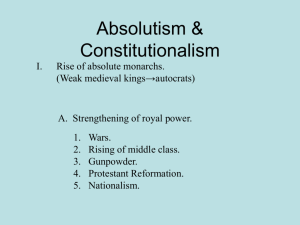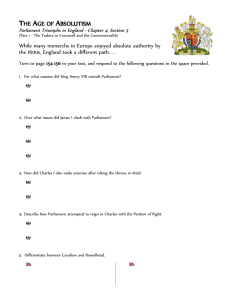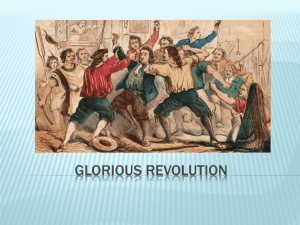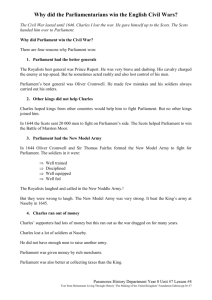English Constitutional Monarchy
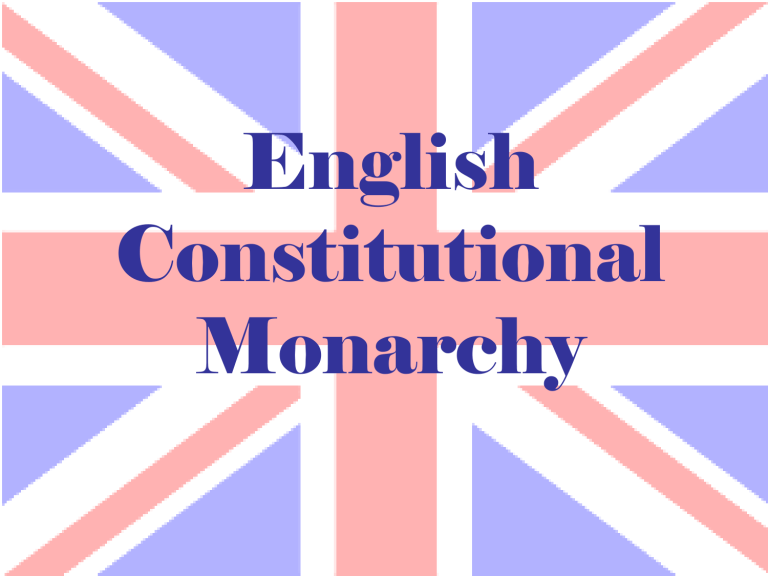
English
Constitutional
Monarchy
• Since the earliest times, the English had a monarchy…kings mostly.
• During the Middle Ages…476 AD (CE) – 1400’s…England, like the rest of Europe, lived under the social hierarchy that was
Feudalism.
• During this time, kings were dependent on the nobles for their support…military and monetary.
• The power, therefore, was primarily in the hands of the nobility.
• They didn’t pay taxes, they were free to do anything they wanted to, to their serfs (dude), they were above the law…and they enjoyed the power…so would you!
• Enter a handsome, kind, brave, clever, and romantic king,
Richard the Lionhearted…so what if he only spoke French!
• Did I mention he was handsome?
• His younger brother, John, was cruel, cowardly, clever, unromantic, and unpopular.
• Richard the Lionhearted only spent 9 months of his reign in
England
• The rest of the time he was off with the Crusades…killing, burning, pillaging, and raping in the name of religion
wherever he could so he could live in luxury.
• John was a really nasty piece of work, and he was bad
‘softsword.’
• His nephew, Arthur, Richard’s son, had a better claim was 5 years old.
• He was always watching his back, as he was convinced all his men were trying to kill him…they were!
• After Richard died, John became king and ruined the economy of England, and Ireland.
• Some of the nobility, Barons, got so fed up with the captured London.
stealing from them and they were ticked off.
In 1215 AD/CE they had had enough and so they………………
John’s tomb effigy
• Forced him to meet their leaders at Runnymede, near
London, on June 15, 1215 to seal the Great Charter called, in Latin, Magna Carta.
• Magna Carta was the most significant early influence on the extensive historical process that led to the rule of constitutional law today.
• Magna Carta influenced many common law and other documents, such as the US Constitution and Bill of
Rights, and is considered one of the most important legal documents in the history of democracy.
• Magna Carta required the king to renounce certain rights, respect certain legal procedures and accept that the will of the king could be bound by law.
• It explicitly protected certain rights of the king's subjects whether free or not - most notably the right of Habeas
Corpus, meaning that they had rights against unlawful imprisonment.
• The power of the king was reduced forever.
• The Magna Carta establishes very important precedents in English government and law.
1. The English monarch was answerable to the people
2. The English monarch was not above the law
3. The idea of Divine Right, in England, was dead…very different from the
French experience as we shall soon see.
4. clause 61, known as the "security clause", the longest portion of the document. This established a committee of 25 barons who could at any time meet and over-rule the will of the King
5. Habeas corpus (Latin: ‘We command that you have the body’) is the name of a legal action, through which a person can seek relief from unlawful detention of themselves or another person.
The writ of habeas corpus has historically been an important instrument for the safeguarding of individual freedom against arbitrary state action.
This one you will get a laugh out of…Clause 54 says that no man may be imprisoned on the testimony of a woman except on the death of her husband.
• Back to nasty King John….
• Whilst crossing a body of water, the Wash…yes, it’s called the Wash…John’s entire treasure disappeared beneath the water and was swallowed up in the mud.
• All his gold, precious jewels, and jewelry gone! …this certainly proves the old saying – everything comes out in the wash!
• King John, famous for his disgusting feeding habits, literally ate himself to death in 1216!
Glass windows introduced to replace brick windows in 1180…I bet the view was better
In 1185 Oxford University began…this is the Bodleian Library.
Knife and fork introduced into England in 1200
• As we are interested in the development of British Constitutional Monarchy, we will skip through the next four centuries…past the Black Death , past the 100 years war, past the revolting Scots, past Henry VIII and all his wives…we are getting close… past the introduction of tobacco and potatoes to England…and finally we land at Elizabeth I.
• Did she leave an heir?
When Elizabeth I dies she leaves no heir to take over the throne
• Here comes the irony…
• She is succeeded by Mary Queen of Scots’ son…do you remember the baby Mary left behind when she fled
Scotland with Darnley?
• This is the baby…all grown up
• Do you think he needed a shrink…a head doctor
• Elizabeth had beheaded the mom and now the son…James…is “headed” to London to become “head” of state
• Can you get your heads around that?
• King James (Stuart) becomes James I of England!
James I
James I… The first of the Stuart dynasty….you remember the baby Queen Mary forgot…well this is him all grown up.
He came to London at the age of 37
He was the first king of all 4 countries of the British Isles…
England, Scotland, Wales, and Ireland
Elizabeth I had left a prosperous country…no bandits, no feuds, hardly any murders, and only a little war with the Spanish.
James dealt with the war easily enough and everything seemed to be okay, apart from – surprise, surprise – religion.
At this time there were three denominations…Anglicans (invented by
Lizzie), Roman Catholics, and Puritans
(hard-line Protestants)
coarse, scruffy, gross, and very full of himself.
• He preferred the ‘company’ of men to women and
Buckingham, the first ever non-royal into a duke.
• At one time his entire court was imprisoned in the ask!
• James did not like the idea of asking permission to act….remember that committee of 25 barons?
• Well it had developed into PARLIAMENT.
Parliament….
• James I’s speech to the House of Commons:
• “I am surprised that my ancestors should ever be permitted such an institution to come into existence.
I am a stranger, and found it here when I arrived, so that I am obliged to put up with what I cannot get rid of!”
war with Spain!
• For your enjoyment…at about things were invented:
• Graphite pencils
• The first installed toilet
• Galileo invented the thermometer
• Dutch opticians invented the telescope
• King James allowed each fiber source
• William Harvey discovered
Two pencils !
Galileo’s Telescope
• Replacing James I was his son Charles I…crowned in
1625
• He was nothing like his father…Nothing!
• Standing a proud 5 foot he was prudish, shy, shifty, and he stammered.
• He really did not understand the English…but then who does?
• He believed if he set a good example, the world would follow…how wrong could he be?
• For a start, he went and married the horribly haughty
Henrietta…the king of France’s daughter.
• Whom his faithful English subjects soon learned to loathe
• Then, with the help of his chief advisor, the Duke of
Buckingham…remember him the handsome ex-boyfriend of his dad…Charles managed to intensify the war with
Spain.
• He asked Parliament for money, to fight, and they told him no and to go get tall!
• So, he tried to get sneaky, he forced people to house and feed his soldiers in their homes
• Parliament finally gave him the money…which he lost and had to ask the Spanish king for peace!
I love his stockings and garter!
How do you suppose he looks as tall as the horse?
Charles I by Van Dyck (1633)
And here is
Henrietta
The Many Faces of Charles I
• Charles was one of those kings who thought he was next in line to God, which meant nobody had the right to question him…“How tall are you your majesty?”
That really got him mad!
• Parliament thought it had the right to question him…they were on a collision course.
• In the end, things came to the crunch over – three guesses?
• Yup, religion
• Parliament passed a law against the Catholic faith which Charles, having
Catholic sympathies, took rather badly…his wife was Catholic!
• He dismissed Parliament and ran the country alone…for 11 years!
• Bye the way, the handsome Buckingham has been knifed to death by a jealous lover…a cavalry lieutenant.
• Charles was strapped for cash, so he taxed the wealthy landowners…not very smart!
• And then for reasons only known to himself he taxed anyone who lived near the sea…the ship tax!
• Hello, England’s an island…everyone lives near the sea!
Ship Money Assessments, 1636
[per square mile]
Are you asking why the blue area, furthest from the sea, has to pay the most ship tax?
• Not content to annoy just the rich, those that live by the sea, and everyone else he has to stick his nose into Scottish religious affairs..
• The Scots were so ticked off they invaded England
• So far so good – way to go Charlie!
• He was in trouble and he needed money, so he called Parliament back, in 1640, after an 11 year absence.
• Charles wanted Parliament to force his army to fight…Parliament refused.
• If that wasn’t bad enough they executed Charles’s two closest advisors the Earl of Stratford and William Laud…which made Charles mad! Really mad!
• He was so mad he took what was left of his army to London to arrest them all!
• Well you just don’t do that to Parliament…and besides they all hid and he couldn’t find them!
• The whole country took sides and whoopee! We have a proper civil war…nice one Charles.
Buckingham
A Cavalier pike men
Royalists
(Cavaliers)
a a a a a a a
House of Lords
North & West of
England
Aristocracy
Large landowners
Church officials
Catholics
The King
Civil War (1621-1649)
Parliamentarians
(Roundheads)
† House of Commons
† South & East of
England
† Puritans
† Merchants
† Townspeople
† More urban , more prosperous
Allegiance of Members of the
Long
Parliament
(1640-1660)
• Although the Cavaliers – another word for swaggerers – initially had the muscle, the Roundheads – so called because of their short hair cuts – soon caught up!
• Parliament had access to lots of money…they taxed everyone!
• They did a sneaky deal with the Scots if they helped fight against
Charles…they lied to the Scots…is that bad?
• The biggest advantage they had was a man called Oliver Cromwell
• A Puritan, Cromwell was MP for Cambridge.
• In 1644 a combination of Roundheads, Scots and Cromwell’s new cavalry beat the pants off the Cavaliers, or Royalists, at Marston Moor.
• Parliament were so ‘stoked’ they asked Cromwell to build a new elite army of professional soldiers – he did…the New Model Army
• The men were paid the amazing sum of 10p a day (10 cents)…wow!
• They were a tough bunch even though they were trained not to drink (alcohol), swear, rape or pillage.
• They never lost a battle
• Charles I saw the writing on the wall and fled to Scotland for safety…
• The Scots promptly filled their sporrans by selling him to Parliament
Oliver Cromwell [1599-1658]
The “Interregnum” Period [1649-1660]
† The Commonwealth
(1649-1653)
† The Protectorate
(1654-1660)
Outside Parliament…today
New Model Army Soldier’s
Catechism
• Parliament forgot to pay the New
Model Army…so, Cromwell offered
Charles a sweet deal.
• This ticked everyone off…and so…Cromwell had to fight his former allies the Scots and the remnants of the
Royalists.
• He won at the Battle of Preston
• Ollie then high-tailed it down to
London.
• He kicked everyone out of Parliament who was not a supporter of his or a
Puritan
• This just left 60
‘Independents’…Members of Parliament
(House Of Commons).
• They called this Parliament ‘the Rump.’
• He now tried the king for treason and then in 1649 at a huge public ceremony, severed Charles I’s head…
Do you think Ollie was happy to be rid of this ‘pain in the neck’?
No longer 5 foot Charles alas got smaller
When he was no longer ‘head’ of state
Henry Halford did an autopsy on the body and stole poor Charles’s fourth vertebra.
• For years he used to horrify his dinner guests by using it as a salt holder.
• Queen Victoria…no sense of humor…ordered him to put it back in the coffin
• Meanwhile, back to Cromwell…things were not going too well
• The army and navy mutinied…so he shot them!
• The Irish were revolting…so he invaded and massacred them!
crowned Charles's son as king…Charles II.
• Cromwell invaded Scotland; Charles took a ‘vacation’ in France!
• Cromwell, not known to be easy to get on with, soon fell out with his ‘rump’…Parliament.
• He fired them all and…He established a ‘military dictatorship’…or ‘Protectorate’.
• Instead of becoming king Oliver I he became Lord Protector.
• He died, of natural causes, aged 60.
ounces (average man’s weighs 49 ounces)…!
• Some time later he was dug up…pooh!...and hanged at Tyburn. As a special treat, that he cared…’cause he was DEAD!
• It remained there for 24 years until 1685 when a strong wind blew it off.
• A guard found it, took it home, and hid it in his chimney…he charged people to see it.
• A syndicate bought it for 230 pounds…they all died mysteriously
(Vista colors!)
• They eventually turned it over to a college in 1960 where it was secretly buried!!!
King Charles II [r. 1660-1685]
a a a a a
Had charm, poise, & political skills.
Restored the theaters and reopened the pubs and brothels closed during the Restoration.
Favored religious toleration.
Had secret Catholic sympathies.
Realized that he could not repeat the mistakes his father had made.
King Charles II [r. 1660-1685]
a 1661 “Cavalier” Parliament [filled with Royalists]
Disbanded the Puritan army.
Pardoned most Puritan rebels.
Restored the authority of the Church of England.
a 1662 Clarendon Code [Act of Uniformity]
All clergy & church officials had to conform to the
Anglican
Book of Common Prayer.
It forbade “non-conformists” to worship publicly, teach their faith, or attend English universities.
King Charles II [r. 1660-1685]
a 1673 Test Act
Parliament excluded all but Anglicans from civilian and military positions.
[to the Anglican gentry, the Puritans were considered
“radicals” and the Catholics were seen as “traitors!”] a 1679 Habeas Corpus Act
Any unjustly imprisoned persons could obtain a writ of
habeas corpus
compelling the govt. to explain why he had lost his liberty.
King James II [r. 1685-1688]…Charles’s brother
a a a
Was a bigoted convert to
Catholicism without any of Charles II’s shrewdness or ability to compromise.
Alienated even the
Tories.
Provoked the revolution that Charles II had succeeded in avoiding !
a a a a a
King James II [r. 1685-1688]
Introduced Catholics into the
High Command of both the army and navy.
Camped a standing army a few miles outside of London.
Surrounded himself with
Catholic advisors & attacked
Anglican control of the universities.
Claimed the power to suspend or dispense with Acts of Parliament.
1687 Declaration of Liberty of Conscience
He extended religious toleration without Parliament’s approval or support.
AND THEN HAD A KID…A CATHOLIC KID…WHO
WOULD INHERIT THE THRONE…
The “Glorious” Revolution: 1688
a Whig & Tory leaders offered the throne jointly to James II’s daughter Mary [raised a Protestant] & her husband, William of Orange…Minute maid to his friends
He was a vigorous enemy of Louis XIV.
He was seen as a champion of the Protestant cause.
English Bill of Rights [1689]
a a a
It settled all of the major issues between King &
Parliament.
It served as a model for the
U. S. Bill of Rights.
It also formed a base for the steady expansion of civil liberties in the 18 c and early 19 c in England .
a
English Bill of Rights [1689]
Main provisions:
1.
2.
3.
4.
5.
6.
The King could not suspend the operation of laws.
The King could not interfere with the ordinary course of justice.
No taxes levied or standard army maintained in peacetime without
Parliament’s consent.
Freedom of speech in Parliament.
Sessions of Parliament would be held frequently.
Subjects had the right of bail, petition, and freedom from excessive fines and cruel and unusual punishment.
7.
8.
9.
The monarch must be a Protestant.
Freedom from arbitrary arrest.
Censorship of the press was dropped.
10.
Religious toleration.
the Crown in England.
• With the passage of the Bill of Rights, it stamped out once and for all any possibility of a Catholic monarchy.
• It ended moves towards absolute monarchy in the British Isles by limiting the monarch's powers.
• These powers were greatly restricted; s/he could no longer suspend laws, levy permission.
• Since 1689, government has been under a system of Constitutional Monarchy in England, and later the U.K…UNINTERUPTED.
• Since then, Parliament's power has steadily increased while the Crown's has steadily declined.
• Unlike in the Civil War of the mid-seventeenth century, the "Glorious d’etat than a social revolution.
• England's new king, William III, had been of the Dutch protestant faith, as



